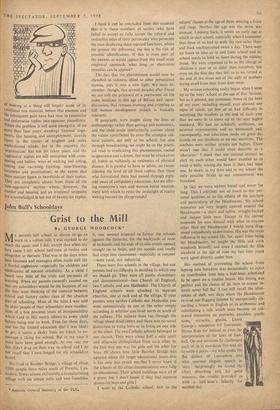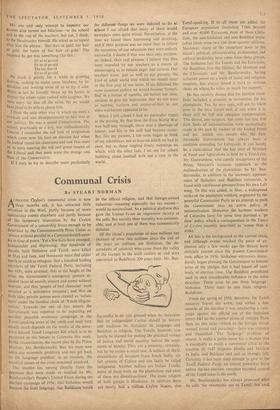John Bull's Schooldays
Grist to the Mill
By GEORGE WOODCOCK* MY parents left school at eleven to go to work in a cotton mill. I was marked to do Much the same, and I did; except that when my turn came I left school half-time at twelve and altogether at thirteen. That was in the days when sour foremen and managers often made mill life a fearful nightmare—especially for children and adolescents of normal sensibility. As a child I heard very little of the trials and purposes of learning. When my parents earnestly assured me that my schooldays would be the happiest of my life they were thinking of the contrast between school and factory rather than of the absolute joys of schooling. Most of the tales I was told by older people of their schooldays were recollec- tions of a few precious years of irresponsibility Which God in His mercy allows -to every child before being sent to work. Even for those days, and for the limited education that I was likely to get, it seems a shaky basis on which to en- courage a liking for school. But in - my case it must have been good enough. At any rate my feet didn't drag on their way to, school and I do not recall that I ever longed for my schooldays to end.
We lived in &Amber Bridge, a village of about 4,000 people three miles south of Preston, Lan- cashire. It was almost exclusively a manufacturing village with six cotton mills and two foundries.
* Assistant General Secretary of the TUC, lt, too, seemed disposed to favour the schools against the factories, for the backyards of most of its houses and the ends of its side-streets opened straight on to fields, and the sounds and smells that crept into classrooms—especially in summer —were rural, not industrial.
There were five schools in the village, but our parents had no difficulty in deciding to which one we should go. They were all public elementary and denominational—two Church of England, two Catholic and one Methodist. The Church of England schools were attached to separate churches, one at each end of the village. If your parents were neither Catholic nor Methodist you went automatically to one or the other simply according to whether you lived north or south of the railway. The railway lines ran through the village about dead-centre and there was no social distinction in being born or in living on one side or the other. The two Catholic schools belonged to one church. They were about half a mile apart and otherwise distinguished from each other by the fact that one was for girls and the other for boys.. (It shows how little Bamber Bridge was agitated about the larger educational issues -that it has only just struck me, that I never knew if the schools of the other denominations were fully co-educational. Their school buildings were all of a piece, but I don't know if they had separate ()lasses for boys and girls.) I went to the Catholic school, first to the infants' classes at the age of three wearing a frock and clogs. Neither the age nor the dress was unusual. Looking back, it seems an early age at which to start school, especially when I remember that three of us had to walk the two miles there and back unchaperoned twice a day. There were no buses to take us to and from school and no school meals to hold us there during the midday break. We were supposed to be in the charge of children a year or so older than ourselves, but even on the first day they left us as we turned at the end of the street out of the sight of mothers seeing us off from their front door-steps.
My serious schooling really began when I went up to the boys' school at the age of five. Serious, but as it proved, not strenuous. None of the boys of my year, including myself, ever showed any signs of talent, yet few of us had difficulty in satisfying the teachers at the end of each year that we were fit to move up to the next higher standard. We had no scholarly ambitions, no external examinations and no homework and, consequently, our education made no great de- mands on our intellects or on our emotions. The teachers were neither tyrants nor bullies. There wasn't one that I could even describe as a 'character.' I think that our natural instinct to stick by each other would have enabled us to resist a bully among the boys if there had been one. In short, in my time and in my school the only possible threat to our contentment was boredom.
In fact we were seldom bored and never for long, This I attribute not so much to our per- sonal qualities as to the efforts of the teachers and particularly of the Headmaster. My school memories are very largely centred around the Headmaster—a short and tubby. straight-backed and dapper little man. Except in his sterner moments his eyes danced with what in anyone other than my Headmaster I would have diag- nosed immediately as devilment. His was the main influence in my school life, for, apart from being the Headmaster, he taught the fifth and sixth standards himself, and since I reached the fifth standard at the age of nine my last four years were spent•directly under him.
His method of preventing the school from lapsing into boredom was occasionally to inject an unorthodox item into a half-hour scheduled to be spent on a routine lesson. His timing was perfect and his choice of an item to arouse in- terest never fell flat. I can still recall the after- noons of dull, wet days when the Headmaster revived our flagging interest by unexpectedly dis- carding a lesson in English or in arithmetic and substituting a talk which soon became an ani- mated discussion on proverbs, parables, quota- tions, miracles, ghosts, Lloyd _ George's ninepence for fourpence, Home Rule for Ireland or even the interpretation of the laws of foot- ball. On one occasion he challenged each of us in standards five and six to write a poem—we who spoke the flat dialect of Lancashire and who spurned elegant speech as 'sissy.' Surprisingly we found the effort absorbing and, for good measure, the results provided us with a half-hour's hilarity for another day. His one and only attempt to improve our accents also turned out hilarious—to the school and to the rest of the teachers, but not, 1 think, to the Headmaster himself. He asked us to repeat after him the phrase: 'Her hair of gold, her hair of gold, the lustre of her hair of gold.' The response he got was something like this: Ur ur of go-aid Ur ur of go-ald The lus-ther of Ur ur of go-ald. He stuck it grimly for a while in growing distress, seeking to make some headway by in- filtration and inviting some of us to try it solo. When at last he literally threw up his hands in despair the whole room rocked with laughter. We Were sorry for him all the same, for we would have liked to be able to please him.
I think the only other way in which we were a constant and sore disappointment to him was in our politics. He was a sound Conservative. The school, practically to a boy, was enthusiastically Liberal. I remember the sad look of resignation Which came over his face on election day when he looked round his classroom and saw that most of us were wearing the red and green rosette of the Liberal and that none wore the orange and blue of the Conservative.
If I were to try to describe more particularly the different things we were induced to do at school I am afraid that many of them would nowadays seem quite trivial. Nevertheless, at the time we found them interesting and diverting, and if their purpose was no more than to relieve the monotony of our education they were entirely successful. I doubt if that was their only purpose, or, indeed, their real purpose. I believe that they were intended by our teachers as a means of encouraging us to remain eager and curious. Our teachers knew, just as well as our parents, the kind of adult world into which we would enter in the first year of our teens. If we followed the most common pattern we would become 'factori- fied' in a matter of months, old before our time, anxious to give the impression that we too were as morose, taciturn and matter-of-fact as our elder workmates appeared to be, When I left school I had no particular regret at the parting. By that time the First World War was half-way through, there was a shortage of labour, and life in the mill had become easier. But, like my parents, I too soon began to think of my schooldays, not as days on which we had to swot, but as those tingling frosty mornings on which, with the other lads, I set out for school babbling about football with not a care in the world.



































 Previous page
Previous page